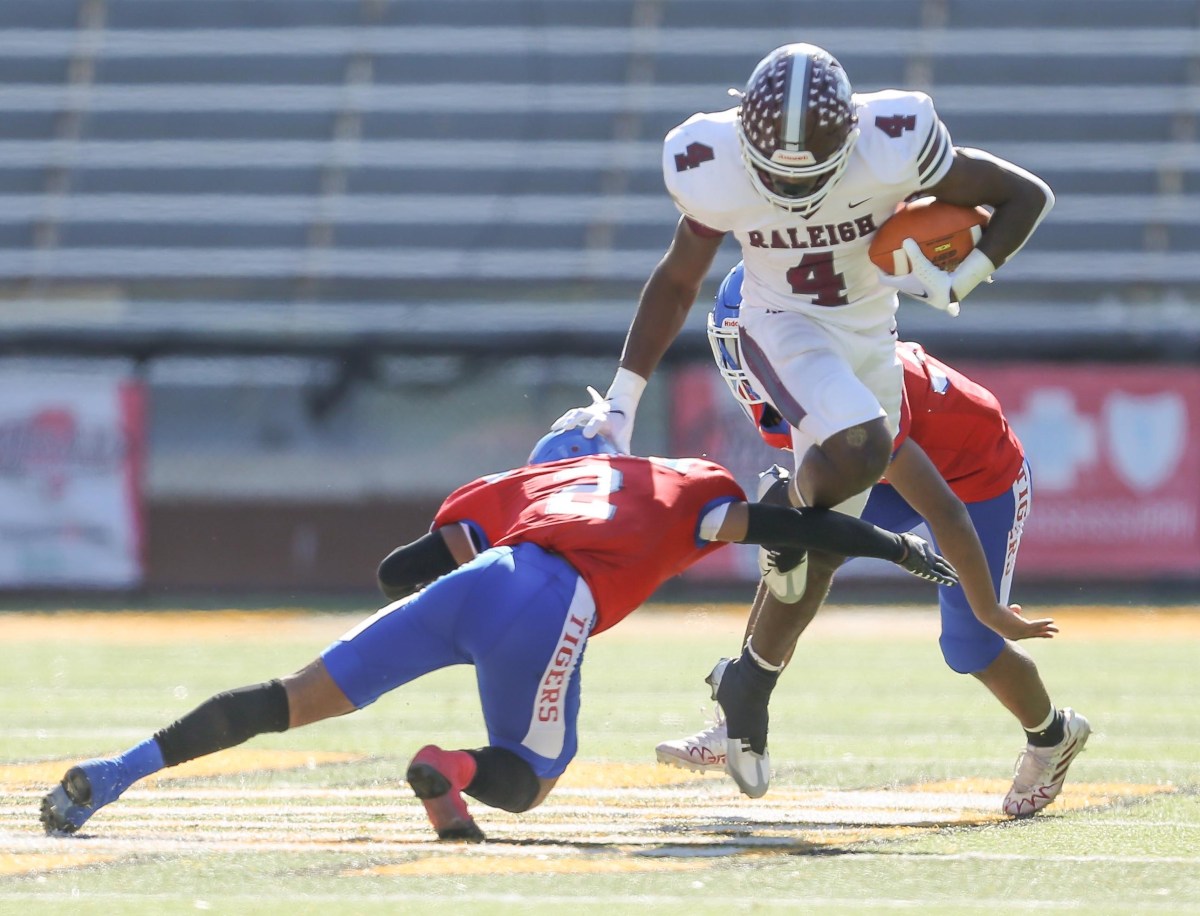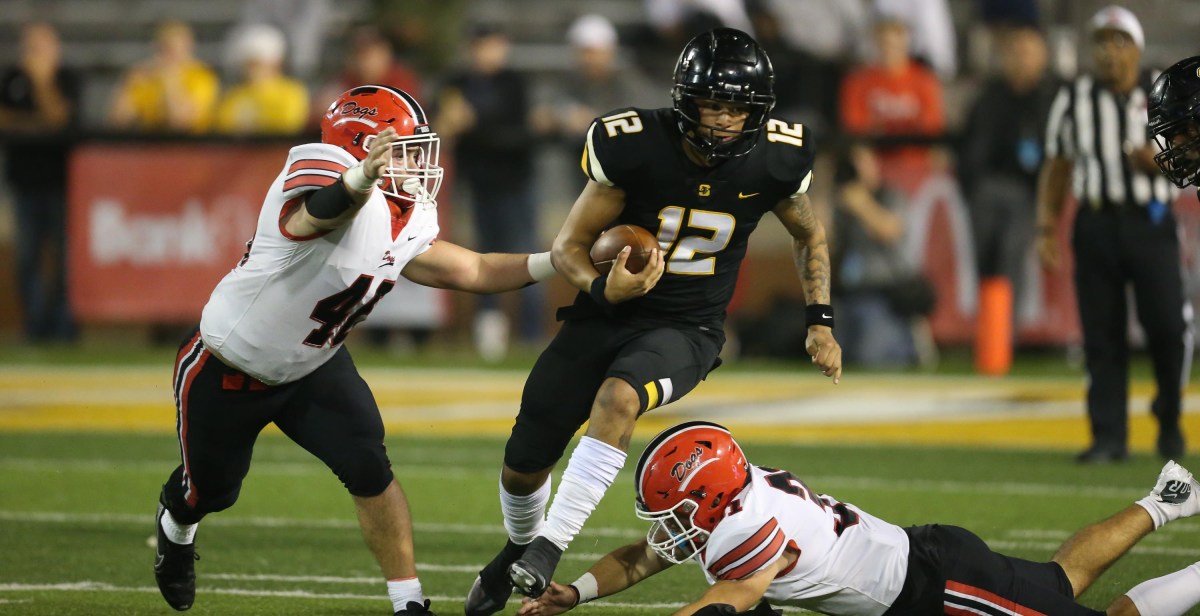Mississippi Today
Six state championships display thrill of victory, agony of defeat
Six state championships display thrill of victory, agony of defeat
HATTIESBURG — The Mississippi High School Activities Association State Football Championships rarely disappoint when it comes to drama – the thrill of victory and the agony of defeat, as “Wide World of Sports” Hall of Fame broadcaster Jim McKay famously put it.
The 2022 championship games, played Friday and Saturday at The Rock at Southern Miss, were no exception. The weekend produced shootouts – such as Raleigh’s 55-52 triumph over Noxubee County in the Class 3A game – and defensive struggles, such as Lousville’s 17-14 conquest of Mendenhall in the Class 4 A championship.
We saw some of the state’s most highly recruited college prospects, streamlined physical athletes such as Raleigh’s Suntarine Perkins and Picayune’s Dante Dowdell. We saw magnificent high school players such as Scott Central’s bowling ball of a quarterback, Quez Goss (5-feet, 9 inches, maybe, and 220 pounds). Get this: In back to back state championships, Goss has produced a total of 14 touchdowns, while his Scott Central team has scored 112 points.
Picayune, winning its second straight 5A championship, emerged as the state’s only undefeated team. With seemingly the entire citizenry of Picayune filling the lower deck on the east side at The Rock, the Maroon Tide finished a perfect 15-0 with only one victory coming by fewer than 10 points.
Louisville won its 11th state championship, tying it with West Point for most football state championships among Mississippi public schools.
Starkville’s championship season deserves special recognition. The Yellowjackets, beset by a brutal schedule and key injuries, lost three straight games in September and October before regrouping to win its last eight, including four straight in the playoffs. Asked who made up that brutal schedule, Jones responded, “I did. You don’t get any better playing cupcakes.”
So, let’s recap the games in the order they were played.

Class 3A: Raleigh 55, Noxubee County 52
What a way to start the weekend: In Raleigh’s 55-52 Class 3A championship victory over Noxubee County, the two teams combined for a MHSAA playoffs record 107 points – not to mention 14 touchdowns, 45 first downs and nearly 1,000 yards of offense. There were only two punts, both by Noxubee.
Rarely, if ever, has an MVP trophy belonged to a more obvious winner. Suntarine Perkins, Raleigh’s do-it-all superstar, provided 331 yards and four touchdowns rushing. He caught three passes for 56 yards. He kicked off. He led his team in tackles and he made a crucial fourth quarter interception to preserve the victory.
Perkins, a heavily muscled, 6-foot-3, 205-pound player, showed why virtually every college coach in the country would love to have him and why Ole Miss head coach Lane Kiffin and Alabama defensive coordinator Pete Golding watched the game from field level, just behind the north end zone. Afterward, Perkins confirmed that Ole Miss, to whom he has verbally committed, and Alabama, are the last two suitors he is considering. One or the other is going to get a remarkable athlete – and take a huge NIL hit – when Perkins signs on the dotted line. He said that will happen “sometime in December.”
It took all of Perkins’ heroics to get the victory. Noxubee County, a perennial Mississippi high school powerhouse, fought all the way to the final gun. Keep this name in mind for future reference: Kamario Taylor. Just a 10th grader, the long-limbed, 6-4, 180-pounder kept Noxubee in it, throwing for five touchdowns.
Taylor was marvelous, but Perkins was even better. He sprinted 74 yards for a touchdown, out-running much smaller people, the first time he touched it. He was just getting started.
Asked how he felt afterward, Perkins smiled. “Real good,” he said, “but my legs I gotta admit are a little tired.”

Class 1A: Bay Springs 22, McEvans 0
Mississippi State commit Tyrick Jones rambled for 136 yards and two touchdowns on 16 carries but it was the Bay Springs defense, which much included Jones, that sparked the Bulldogs to the school’s second straight state championship. After Friday’s first game produced 107 points, Bay Springs allowed none, serving to reinforce the age-old adage: Defense wins championships.
Bay Springs did not complete a single pass, but ran for 270 yards and allowed McEvans only 149 yards of total offense. Why throw it if you don’t need to?
It was Bay Springs’ sixth shutout of the season and the 11th time the Bulldogs have held an opponent to one score or fewer scores. McEvans had averaged 42 points per game in three previous playoffs victory but couldn’t crack the Bay Springs defense, which did not give up a score in four playoffs games.
Said Jones, a 225-pounder who likely will play on the defensive side of the ball at State, “Our plan was to run the ball down their throat, and that’s what we did. We were going to pound and pound it until they quit.”

Class 5A: Picayune 31, West Point 21
Defending State 5A Champ Picayune fell behind perennial powerhouse West Point 14-3 Friday night but there was no panic along the Maroon Tide sidelines. When you have a stable of running backs, led by four star recruit Dante Dowdell, why panic?
After running for 190 yards and three touchdowns, Dowdell, the MVP, explained, “We’ve got a lot of guys that have heart. When we get a head of steam and start going downhill, we’re hard to stop.”
Chris Smith also ran for 104 yards for the Maroon Tide, which was playing West Point in the state championship game for the second consecutive year. Dowdell, who stands 6 feet, 1 inch and weighs 215 pounds, displayed a remarkable blend of speed and power against a normally salty West Point defense.
“He’s a great player,” Picayune coach Cody Stogner said of Dowdell. “Sometimes you just gotta let a great player play. We’ve had him for four years, and he’s just gotten better and better every year. We lean on him heavily, and we did again tonight. Like always, he delivered.”

Class 4A: Louisville 17, Mendenhall 14
Make that 11 for 11 for the Lousville Wildcats. After defeating Mendenhall 17-14 for the 4A State Championship Saturday, the Wildcats have advanced to a state championship game 11 times. They have won all 11. None could have been any more difficult than the three-point victory over the Mendenhall Tigers.
Junior Ceidrick Hunt booted a 27-yard field goal as time expired to give Louisville the winning margin in a game mostly dominated by the two defenses.
You think there isn’t pressure to win in a tradition-rich program such as Louisville? “I didn’t want to be the first coach (at Louisville) to come down here and lose in the finals,” said Louisville head coach Tyrone Shorter.
It looked like that might happen. Mendenhall was driving late in the fourth quarter when the Wildcats forced the game’s only turnover. Senior Gabe Moore forced a fumble, which was recovered by sophomore Ja’cari Owens at the Mendenhall 43-yard-line with 32 seconds remaining in regulation. Senior quarterback Keyarrion Jackson led a short drive to produce the game-winning field goal.
Louisville is now tied with West Point for most state championships among Mississippi public schools teams. Both have won 11. Said Jackson, “Now we’re part of the legacy.”

Class 2A: Scott Central 42, Charleston 12
Next season, the Class 2A State Championship can be someone else’s playground. Scott Central quarterback Quez Goss won’t be around to show off again. Goss, who accounted for eight touchdowns in Scott Central’s 70-26 romp over Leflore County last December, was responsible for six more in the Rebels’ 42-12 pasting of Charleston Saturday.
Goss plays a lot taller than his 5 feet, 9 inches. He throws the deep ball with uncanny accuracy. And he throws primarily to two senior wide receivers who can go up and get it. Southern Miss commit Javieon Butler hauled in five catches for 131 yards and two touchdowns, while Antreyvious Edwards had three catches for 133 yards and three touchdowns.
“When you’ve got guys like those, it makes my job so much easier,” Goss said. “I just launch it downfield and let them go get it.”
Goss was being overly modest. He finished 9-of-14 passing for 281 yards with five touchdowns and also added a rushing touchdown. He was a clear cut for choice for MVP for a second consecutive season.
Since 1999, Scott Central has won four state championships and been the runner-up twice.

Class 6A: Starkville 48, Brandon 32
Oddsmakers don’t make point spreads for high school football games, but powerhouse Brandon, which entered at 12-1, would have been favored over a Starkville team that started 0-3 in its own region this season. But Starkville took control at the beginning and coasted to the championship victory.
Junior quarterback Trey Petty led the way, throwing for two touchdown and running for three more. He was named the MVP but Starkville coach Chris Jones had another name for him. “He’s a dog,” Jones said. “I’m happy he’s on my team. He does a good job, and has been doing a good job all year. He had a rough patch early in the year when he was struggling and playing through injuries, but he bounced back. That’s what champions do.”
Starkville scored on seven of its 10 possessions and four of its first six. The Yellowjackets led 21-3 at halftime and then 28-3 early in the third quarter. Brandon finally got its offense in gear in the second half, but by then it was too late. Quarterback Landon Varnes passed for 297 yards and halfback Nate Blount powered for 184 yards on 24 carries, but it was not nearly enough.
The championship was the seventh in Starkville history but the first since 2015. Chris Jones has now won state championships at both Kemper County and Starkville.
This article first appeared on Mississippi Today and is republished here under a Creative Commons license.
Mississippi Today
Mississippi Gulf Coast commemorates two decades since Hurricane Katrina
GULFPORT — A Hurricane Hunter flyby Friday opened the 20th anniversary ceremony of Hurricane Katrina at the Barksdale Pavilion in Gulfport, filled with hundreds of people who each has a story of where they were on Aug. 29, 2005, and how Katrina changed their lives.
It ended about 90 minutes later with the young choir from St. James Catholic Church in Gulfport joining songwriter Steve Azar in an energetic rendition of “One Mississippi,” the state song.
It was as if the ceremony and the many photographs and memories brought out and examined this week ripped off the bandage to the pain of Katrina and the loss of 238 people.
Here are the five most memorable quotes of the day from Gulfport:
“We’re so blessed. We’re so fortunate,” said Gulfport Mayor Hugh Keating, whose home was flooded with 8 feet of water during Katrina. “We survived, and we thrived,” he said of south Mississippi.
He and all the speakers saluted the volunteers who came from across the country and even the world to help with the recovery — “960,000. I had no idea there was that many,” Keating said.
The speaker’s platform, set up where the storm surge rushed in to devastate Gulfport, is close to the Mississippi Aquarium and Island View Casino, which opened since the storm. The State Port of Gulfport was rebuilt and the downtown is revitalized, with a lively restaurant scene and offices.
“We coined a new word after Katrina — ‘slabbed,’” said Haley Barbour, who was governor at the time Katrina struck. From Waveland, where after the devastating storm surge “every structure was destroyed,” he said, to Pascagoula, 80 miles away from the center and still with so many homes lost, “It looked like the hand of God had wiped away the Coast — utter destruction,” he said.
The audience gave Barbour and his wife, Marsha, standing ovations. She was at Camp Shelby in Hattiesburg the day before Katrina and “came down with the troops,” her husband said. She was on the Coast, making sure needs were met, for months.
“We are always better together,” said Tulsi Gabbard, U.S. director of national intelligence, who greeted the crowd with an “Aloha.” Listening to the stories from Katrina on the 20th anniversary reminded her of the fires that destroyed Lahaina on Maui in her native state of Hawaii, she said, when 102 people died and the area was left with total devastation.
We will always remember those lost, she said, “But my hope is that we remain inspired, as we stand here 20 years later, by what came after, and remember the unity that we felt, remember the strength that came from all of us coming together as neighbors, as friends, as colleagues, as Americans, that allowed us to get through these historic disasters.”
“Together, we proved you should never bet against Mississippi,” said Gov. Tate Reeves. At the time, Katrina was five times the size of any natural disaster to hit the United States, he said.
People returned home to find nothing but “steps to nowhere,” every other trace of their home gone. Their churches, schools and offices also were damaged and destroyed.
Sen. Trent Lott and Sen. Thad Cochran fought for federal funds, working with state officials and Gov. Barbour to bring south Mississippi back, he said. “Everyone knew who was in charge, and that was Gov. Barbour,” he said. “He never once wavered. He never once quit.”
If Mississippi only built the Coast back to what it was, the state would have failed, was Barbour’s mantra after Katrina and the vision for south Mississippi today. The priorities initially were homes, jobs and schools, and in the 20 years since, south Mississippi has seen great business growth.
“Hurricane roulette,” is how Lt. Gov. Delbert Hosemann terms it. “Sooner or later it will be our time,” he said, but Mississippi is better prepared than it was for Katrina. Homes and offices were built back stronger and, “We have money set aside in the state,” he said. Mississippi has $1 billion in the windpool between cash and reinsurance for another major storm that one day will come.
This article first appeared on Mississippi Today and is republished here under a Creative Commons Attribution-NoDerivatives 4.0 International License.
The post Mississippi Gulf Coast commemorates two decades since Hurricane Katrina appeared first on mississippitoday.org
Note: The following A.I. based commentary is not part of the original article, reproduced above, but is offered in the hopes that it will promote greater media literacy and critical thinking, by making any potential bias more visible to the reader –Staff Editor.
Political Bias Rating: Center-Right
This article presents a respectful and largely positive reflection on the recovery efforts following Hurricane Katrina, highlighting leadership from Republican figures such as former Governor Haley Barbour and current Governor Tate Reeves. The tone emphasizes resilience, unity, and effective governance, with no overt criticism of political actors or policies. The inclusion of Tulsi Gabbard, a figure with a complex political background, is framed in a unifying and nonpartisan manner. Overall, the content leans slightly toward a center-right perspective by focusing on conservative leadership and state-led recovery success without engaging in partisan debate.
Mississippi Today
Two Mississippi media companies appeal Supreme Court ruling on sealed court files
A three-judge panel of the Mississippi Supreme Court has ruled that court records in a politically charged business dispute will remain confidential, even though courts are supposed to be open to the public.
The panel, comprised of Justice Josiah Coleman, Justice James Maxwell and Justice Robert Chamberlin, denied a request from Mississippi Today and the Sun Herald that sought to force Chancery Judge Neil Harris to unseal court records in a Jackson County Chancery Court case or conduct a hearing on unsealing the court records.
The Supreme Court panel did not address whether Harris erred by sealing court records and it has not forced the judge to comply with the court’s prior landmark decisions detailing how judges are allowed to seal court records in extraordinary circumstances.
The case in question has drawn a great deal of public interest. The lawsuit seeks to dissolve a company called Securix Mississippi LLC that used traffic cameras to ticket uninsured motorists in numerous cities in the state.
The uninsured motorist venture has since been disbanded and is the subject of two federal lawsuits, neither of which are under seal. In one federal case, an attorney said the chancery court file was sealed to protect the political reputations of the people involved.
READ MORE: Private business ticketed uninsured Mississippi vehicle owners. Then the program blew up.
Quinton Dickerson and Josh Gregory, two of the leaders of QJR, are the owners of Frontier Strategies. Frontier is a consulting firm that has advised numerous elected officials, including four sitting Supreme Court justices. The three justices who considered the media’s motion for relief were not clients of Frontier.
The two news outlets on Thursday filed a motion asking the Supreme Court for a rehearing.
Courts are open to public
In their motion for a rehearing, the media companies are asking that the Supreme Court send the case back to chancery court, where Harris should be required to give notice and hold a hearing to discuss unsealing the remaining court files.
Courts and court files are supposed to be open and accessible to the public. The Supreme Court has, since 1990, followed a ruling that lays out a procedure judges are supposed to follow before closing any part of a court file. The judge is supposed to give 24 hours notice, then hold a hearing that gives the public, including the media, an opportunity to object.
At the hearing, the judge must consider alternatives to closure and state any reasons for sealing records.
Instead, Harris closed the court record without explanation the same day the case was filed in September 2024. In June, Harris denied a motion from Mississippi Today to unseal the file.
The case, he wrote in his order, is between two private companies. “There are no public entities included as parties,” he wrote, “and there are no public funds at issue. Other than curiosity regarding issues between private parties, there is no public interest involved.”
But that is at least partially incorrect. The case involves Securix Mississippi working with city police departments to ticket uninsured motorists. The Mississippi Department of Public Safety had signed off on the program and was supposed to be receiving a share of the revenue.
Mississippi Today and the Sun Herald then filed for relief with the state Supreme Court, arguing that Harris improperly closed the court file without notice and did not conduct a hearing to consider alternatives.
After the media outlets’ appeal to the Supreme Court, Harris ordered some of the records in the case to be unsealed.
But he left an unknown number of exhibits under seal, saying they contain “financial information” and are being held in a folder in the Chancery Clerk’s Office.
File improperly sealed, media argues
The three-judge Supreme Court panel determined the media appeal was no longer relevant because Harris had partially unsealed the court file.
In the news outlets’ appeal for rehearing, they argue that if the Supreme Court does not grant the motion, the state’s highest court would virtually give the press and public no recourse to push back on judges when they question whether court records were improperly sealed.
“The original … sealing of the entire file violated several rights of the public and press … which if not overruled will be capable of repetition yet, evading review,” the motion reads.
The media companies also argue that Harris’ order partially unsealing the chancery court case was not part of the record on appeal and should not have been considered by the Supreme Court. His order to partially unseal the case came 10 days after Mississippi Today and the Sun Herald filed their appeal to the Supreme Court.
READ MORE: Judge holds secret hearing in business fight over uninsured motorist enforcement
Charlie Mitchell, a lawyer and former newspaper editor who has taught media law at the University of Mississippi for years, called Judge Harris’ initial order keeping the case sealed “illogical.” He said the judge’s second order partially unsealing the case appears “much closer” to meeting the court’s standard for keeping records sealed, but the judge could still be more specific and transparent in his orders.
Instead of simply labeling the sealed records as “financial information,” Mitchell said the Supreme Court could promote transparency in the judiciary by ordering Harris to conduct a hearing — something he should have done from the outset — or redact portions of the exhibits.
“Closing a record or court matter as the preference of the parties is never — repeat never — appropriate,” Mitchell said. “It sounds harsh, but if parties don’t want the public to know about their disputes, they should resolve their differences, as most do, without filing anything in a state or federal court.”
This article first appeared on Mississippi Today and is republished here under a Creative Commons Attribution-NoDerivatives 4.0 International License.
The post Two Mississippi media companies appeal Supreme Court ruling on sealed court files appeared first on mississippitoday.org
Note: The following A.I. based commentary is not part of the original article, reproduced above, but is offered in the hopes that it will promote greater media literacy and critical thinking, by making any potential bias more visible to the reader –Staff Editor.
Political Bias Rating: Center-Left
The content focuses on transparency, accountability, and the public’s right to access court records, which aligns with values often emphasized by center-left perspectives. It critiques the sealing of court documents and advocates for media and public oversight of judicial processes, reflecting a concern for government openness and checks on power. However, the article maintains a factual tone without overt political partisanship, situating it slightly left of center due to its emphasis on transparency and media rights.
Mississippi Today
Judge: Felony disenfranchisement a factor in ruling on Mississippi Supreme Court districts
The large number of Mississippians with voting rights stripped for life because they committed a disenfranchising felony was a significant factor in a federal judge determining that current state Supreme Court districts dilute Black voting strength.
U.S. District Judge Sharion Aycock, who was appointed to the federal bench by George W. Bush, last week ruled that Mississippi’s Supreme Court districts violate the federal Voting Rights Act and that the state cannot use the same maps in future elections.
Mississippi law establishes three Supreme Court districts, commonly referred to as the northern, central and southern districts. Voters elect three judges from each to the nine-member court. These districts have not been redrawn since 1987.
READ MORE: Mississippians ask U.S. Supreme court to strike state’s Jim Crow-era felony voting ban
The main district at issue in the case is the central district, which comprises many parts of the majority-Black Delta and the majority-Black Jackson Metro Area.
Several civil rights legal organizations filed a lawsuit on behalf of Black citizens, candidates, and elected officials, arguing that the central district does not provide Black voters with a realistic chance to elect a candidate of their choice.
The state defended the districts arguing the map allows a fair chance for Black candidates. Aycock sided with the plaintiffs and is allowing the Legislature to redraw the districts.
The attorney general’s office could appeal the ruling to the U.S. 5th Circuit Court of Appeals. A spokesperson for the office stated that the office is reviewing Aycock’s decision, but did not confirm whether the office plans to appeal.
In her ruling, Aycock cited the testimony of William Cooper, the plaintiff’s demographic and redistricting expert, who estimated that 56,000 felons were unable to vote statewide based on a review of court records from 1994 to 2017. He estimated 60% of those were determined to be Black Mississippians.
Cooper testified that the high number of people who were disenfranchised contributed to the Black voting age population falling below 50% in the central district.
Attorneys from Attorney General Lynn Fitch’s office defended the state. They disputed Cooper’s calculations, but Aycock rejected their arguments.
The AG’s office also said Aycock should not put much weight on the number of disenfranchised people because the U.S. Fifth Circuit Court of Appeals previously ruled that Mississippi’s disenfranchisement system doesn’t violate the Equal Protection Clause of the 14th Amendment.
Aycock, however, distinguished between the appellate court’s ruling that the system did not have racial discriminatory intent and the current issue of the practice having a racially discriminatory impact.
“Notably, though, that decision addressed only whether there was discriminatory intent as required to prove an Equal Protection claim,” Aycock wrote. “The Fifth Circuit did not conclude that Mississippi’s felon disenfranchisement laws have no racially disparate impact.”
Mississippi has one of the harshest disenfranchisement systems in the nation and a convoluted method for restoring voting rights to people.
Other than receiving a pardon from the governor, the only way for someone to regain their voting rights is if two-thirds of legislators from both chambers at the Capitol, the highest threshold in the Legislature, agree to restore their suffrage.
Lawmakers only consider about a dozen or so suffrage restoration bills during the session, and they’re typically among the last items lawmakers take up before they adjourn for the year.
Under the Mississippi Constitution, people convicted of a list of 10 types of felonies lose their voting rights for life. Opinions from the Mississippi Attorney General’s Office have since expanded the list of specific disenfranchising felonies to 23.
The practice of stripping voting rights away from people for life is a holdover from the Jim Crow era. The framers of the 1890 Mississippi Constitution believed Black people were most likely to commit certain crimes.
Leaders in the state House have attempted to overhaul the system, but none have gained any significant traction in both chambers at the Capitol.
Last year, House Constitution Chairman Price Wallace, a Republican from Mendenhall, advocated a constitutional amendment that would have removed nonviolent offenses from the list of disenfranchising felonies, but he never brought it up for a vote in the House.
Wallace and House Elections Chairman Noah Sanford, a Republican from Collins, are leading a study committee on Sept. 11 to explore reforms to the felony suffrage system and other voting legislation.
Wallace previously said on an episode of Mississippi Today’s “The Other Side” podcast that he believes the state should tackle the issue because one of his core values, part of his upbringing, is giving people a second chance, especially once they’ve made up for a mistake.
“This issue is not a Republican or Democratic issue,” Wallace said. “It allows a woman or a man, whatever the case may be, the opportunity to have their voice heard in their local elections. Like I said, they’re out there working. They’re paying taxes just like you and me. And yet they can’t have a decision in who represents them in their local government.”
This article first appeared on Mississippi Today and is republished here under a Creative Commons Attribution-NoDerivatives 4.0 International License.
The post Judge: Felony disenfranchisement a factor in ruling on Mississippi Supreme Court districts appeared first on mississippitoday.org
Note: The following A.I. based commentary is not part of the original article, reproduced above, but is offered in the hopes that it will promote greater media literacy and critical thinking, by making any potential bias more visible to the reader –Staff Editor.
Political Bias Rating: Center-Left
This article presents a focus on voting rights and racial justice issues, highlighting the impact of felony disenfranchisement on Black voters in Mississippi. It emphasizes civil rights concerns and critiques longstanding policies rooted in the Jim Crow era, which aligns with center-left perspectives advocating for expanded voting access and systemic reform. The coverage is factual and includes viewpoints from multiple sides, but the framing and emphasis on racial disparities and voting rights restoration suggest a center-left leaning.
-
News from the South - Texas News Feed5 days ago
Racism Wrapped in Rural Warmth
-
News from the South - Missouri News Feed6 days ago
Donors to private school voucher program removed from Missouri transparency site
-
News from the South - Alabama News Feed5 days ago
Child in north Alabama has measles, says Alabama Department of Public Health
-
News from the South - Florida News Feed7 days ago
Ukraine’s independence-era voices say Russia’s effort to keep control has lasted decades
-
News from the South - Texas News Feed6 days ago
Texas Democrats’ walkout prompts GOP retribution
-
Local News6 days ago
MSU unveils mixed-use development featuring boutique hotel, cultural landmark
-
News from the South - Tennessee News Feed6 days ago
A marsh bird found in Tennessee wetlands is endangered. FWS is drafting a plan.
-
News from the South - Alabama News Feed7 days ago
Wilsonville residents seek preemptive strike against massive data center project



















































